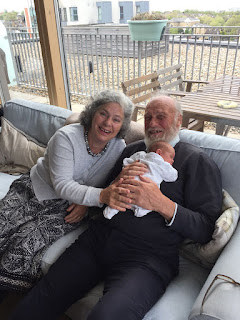 |
| Battersea Temple of Power. |
A cold rain is dripping on London, but I am in a warm, modern flat looking over the Thames and Chelsea Bridge. Below are the same old multiple railway tracks that I quite often trundled over in the days when the power station actually turned coal into electricity. It's resemblance to the Liverpool Anglican Cathedral was no mere coincidence; they were both designed by Sir Giles Gilbert Scott. Considering what a massive construction the power station is, all built in brick, it did not actually serve its original function very long,- forty years in the case of the first half, and only 30 in the case of the second, which was built just after WW2.
Since electricity generation ceased in 1983, we have had as many years of faffing about plans and money, before the iconic ‘Temple of Power’, with Arabs to the rescue, is realising a new lease of life as commercial and residential property, and a tourist attraction. I wonder what old Denis Guilfoyle would have made of it? Born in Co Kilkenny, he worked here in the power station for years, before retiring to Glencolumbkille with his Donegal wife. Tourists used to stop and take pictures of him with his donkey and cart, bringing turf down from the bog. “Well then bruvver, doddlin’ along awright today are yer?” he would greet me, with an incongruous Cockney accent.
Even Cockney accents seem to be hard to come by here in London nowadays, though of course they can come out of the mouth of a West Indian as well as that of an Irishman or even of your real Cockney. Into the melting pot we have all gone, strangely enough along with the grand confidence in technology of the second half of the 20th Century. Not that all of us shared this confidence! We contrarians at least half twigged the crises coming up, although actually it was the exhaust fumes in the streets, and the tobacco fumes in the office, that chased me from London as much as anything else. Things have improved since I suppose, but there’s still a long, long way to go. Thank God we were able to rear our family with good air and food!
All nine children! Sometimes this exclamation comes in tones of reproach from the 'environmentally aware'. I am inclined to answer that in this part of the world, it’s not too many people that are the real problem, but too many cars; and indeed we have managed very well without owning a car for four years. One does have to organise one’s life accordingly; living in Horseshoe Cottage only works because we can get public transport to our gate, and especially because this is free for pensioners in Ireland.
There remains the little matter of the Anna M and her diesel engine. I have long thought about some kind of hybrid power for her, as I mentioned in the last post but one, The Rot Beneath the Floor. As things stand, I tie off the prop so that it doesn’t spin uselessly when we are sailing well, thinking meanwhile that it would hardly cause more drag if it were charging a bank of batteries. How lovely it would be to do without noisy, dirty and vibrating diesel engines, quite apart from the exhaust! Such micro considerations should help us address those maxi ones like climate change.

I have plenty of social and psychological objections to the cult of the motor car too, but leave them for another day. I hope that the lifespan of internal combustion engines will prove almost as short as that of coal-fired power stations,- and that our grandchildren will enjoy correspondingly long ones. I am here in London largely to meet our 22nd, Ella. Meanwhile, I also need to find some rich Arab, interested in non-polluting ways of getting around by sea. It would only be a drop in the ocean compared to this Battersea project!








